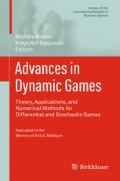Abstract
We study an evolutionary game with two asymmetric populations where agents from each population are randomly paired with members of the other population. We present two imitation models. In the first model, dissatisfaction drives imitation. In the second model, agents imitate the successful. In the first model, we use a simple reviewing rule, while in the second model we use a proportional imitation rule where switching depends on agents comparing their payoffs to others’ payoffs. We show that such imitative behavior can be approximated by a replicator dynamic system. We characterize the evolutionarily stable strategies for a two asymmetric populations normal form game and we show that a mixed strategy is evolutionary stable if and only if it is a strict Nash equilibrium. We offer one clear conclusion: whom an agent imitates is more important than how an agent imitates.
Access this chapter
Tax calculation will be finalised at checkout
Purchases are for personal use only
Preview
Unable to display preview. Download preview PDF.
References
Alos-Ferrer, Weidenholzer, S.: Imitation, Local Interactions and Efficiency. Economics Letters 93(2), 163–168 (2006)
Apesteguia, J., Huck, S., Oechssler, J.: Imitation-theory and experimental evidence. Journal of Economic Theory 136, 217–235 (2007)
Björnerstedt, J., Weibull, J.: Nash equilibrium and evolution by imitation. In: Arrow, K. et al. (eds.) The Rational Foundations of Economic Behaviour. Macmillan, Hampshire (1996)
Hines, W.G.S.: Three Characterizations of Population Strategy Stability. Journal of Applied Probability 17, 333–340 (1980)
Hofbauer, J., Sigmund, K.: Evolutionary Games and Population Dynamics. Cambridge University Press, Cambridge (2002)
Rice, S.H.: Evolutionary Theory: Mathematical and Conceptual Foundations. Sinauer Associates, Sunderland (2004)
Maynard Smith, J.: The theory of games and the evolution of animal conflict. Journal of Theoretical Biology 47, 209–222 (1974)
Samuelson, L., Zhang, J.: Evolutionary Stability in Asymmetric Games. Journal of Economic Theory 57, 363–391 (1992)
Schlag, K.H.: Why Imitate, and if so, How? A Boundedly Rational Approach to Multi-Armed Bandits. Journal of Economic Theory 78(1), 130–156 (1998)
Schlag, K.H.: Which One Should I Imitate. Journal of Mathematical Economics 31(4), 493–522 (1999)
Taylor, P.: Evolutionarily stable strategies with two types of player. Journal of Applied Probability 16, 76–83 (1979)
Vega-Redondo, F.: The evolution of Walrasian behavior. Econometrica 65, 375–384 (1997)
Vega-Redondo, F.: Evolution, Games, and Economic Behavior. Oxford University Press, Oxford, New York (1996)
Weibull, W.J.: Evolutionary Game Theory. MIT, Cambridge (1995)
Author information
Authors and Affiliations
Corresponding author
Editor information
Editors and Affiliations
Rights and permissions
Copyright information
© 2011 Springer Science+Business Media, LLC
About this chapter
Cite this chapter
Accinelli, E., Brida, J.G., Carrera, E.J.S. (2011). Imitative Behavior in a Two-Population Model. In: Breton, M., Szajowski, K. (eds) Advances in Dynamic Games. Annals of the International Society of Dynamic Games, vol 11. Birkhäuser Boston. https://doi.org/10.1007/978-0-8176-8089-3_14
Download citation
DOI: https://doi.org/10.1007/978-0-8176-8089-3_14
Published:
Publisher Name: Birkhäuser Boston
Print ISBN: 978-0-8176-8088-6
Online ISBN: 978-0-8176-8089-3
eBook Packages: Mathematics and StatisticsMathematics and Statistics (R0)

